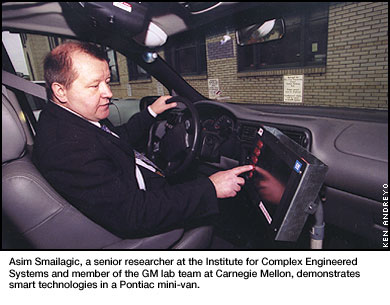|
|
||
|
|
|
 $8 Million GM Grant Supports "Smart Car" Development � Carnegie Mellon will receive $8 million over the next five years from General Motors to continue "smart car" research that will revolutionize the way vehicles and drivers interact. This research aims to make the vehicle of the future more aware of driver needs and preferences, road and weather conditions, and other external information available over the Internet. The vehicle will then automatically modify its own behavior accordingly. One of the many projects under way in the General Motors Collaboration Laboratory at Carnegie Mellon is a "gesture interface," the ability to point or wave to control a car's electronic system. "The gesture interface, being developed on a specially outfitted Pontiac mini-van, is just one example of how we are changing the relationship between cars and drivers," said Ed Schlesinger, co-director of the General Motors Collaborative Laboratory. The team at Carnegie Mellon has installed cameras to watch for the gestures that would normally serve as the drivers' commands. There are also microphones attached to the driver's seat belt so the vehicle's speech recognition system can accept verbal commands from the driver and a liquid crystal display monitor featuring navigation advice, email and a daily schedule. Carnegie Mellon researchers will work to create the new car of the future equipped with the latest wireless networks and Global Positioning Satellite technology designed to keep drivers and passengers safe and on time wherever they may be headed. A number of projects are focused on the way cars are designed and how the systems within the vehicle configure themselves to optimize the overall system performance. "Our goal is to present this information in a way that enhances the driving experience and to create systems that increase safety," Schlesinger said. "We welcome the long collaboration with GM to make this research possible, and we look forward to adapting our new findings to even more sophisticated smart car technology." More than 150 Carnegie Mellon engineering alumni now work in GM plants and labs worldwide. "The renewal of the Collaborative Research Lab (CRL) with Carnegie Mellon for five years is a clear indication of how GM views the strategic partnership/relationship with Carnegie Mellon," said Roger D. Fruechte, director of the Electrical and Controls Integrated Lab, GM/R&D. "The work within the CRL supplements internal work at GM in technologies that GM considers strategic for its success, and will accelerate the pace of innovation. The CRL at Carnegie Mellon is an important part of the globalization of GM R&D." Other GM lab team members are studying ways to design the car's computer systems so they will be "context aware." "By context aware, we mean that the computer system knows enough about the driver and about the vehicle's surroundings that it anticipates when the driver needs certain information," said Asim Smailagic, a senior researcher and a member of the GM lab team at Carnegie Mellon. Other GM lab work includes upgrading a system in which computer menus for operating the radio and navigation systems are projected on the vehicle's heads-up display. � � � � � � � �
�
Top�
�
�
Chriss Swaney
|
|
This Issue's Headlines || Carnegie Mellon News Home || Carnegie Mellon Home |
||